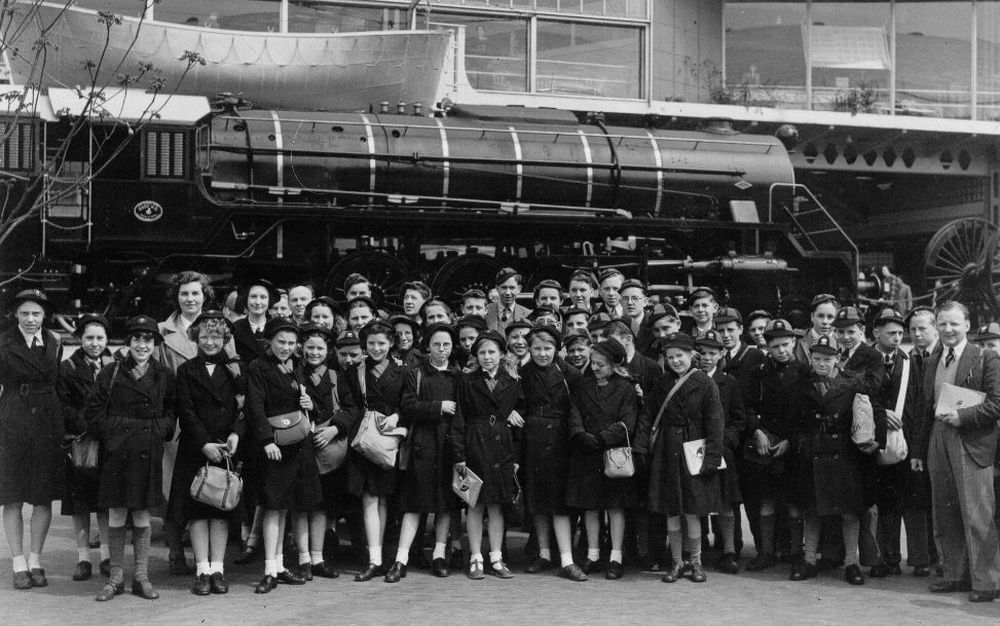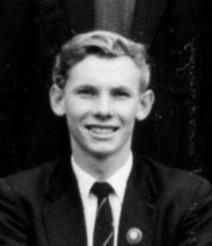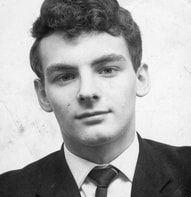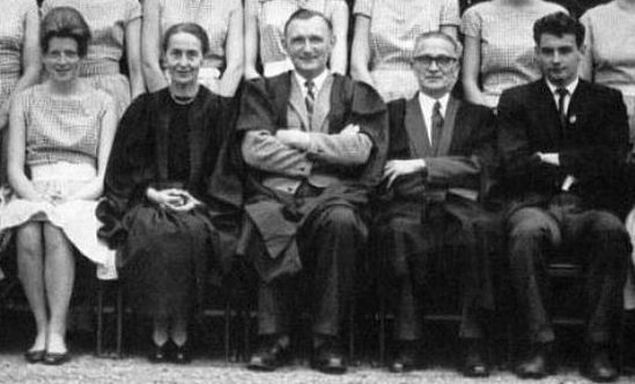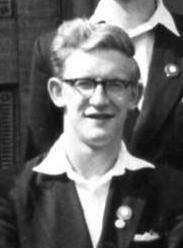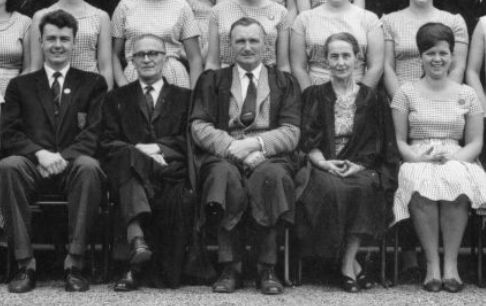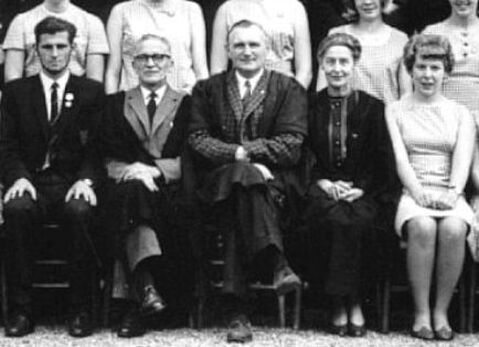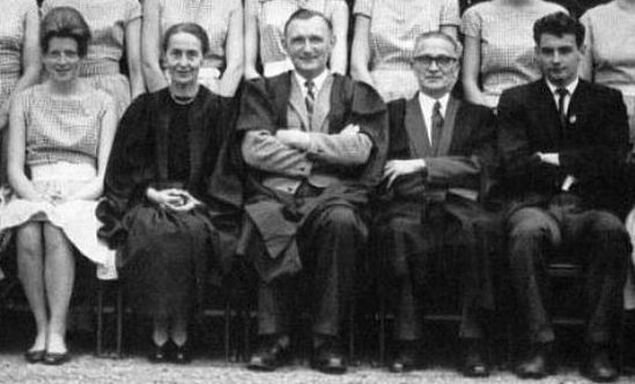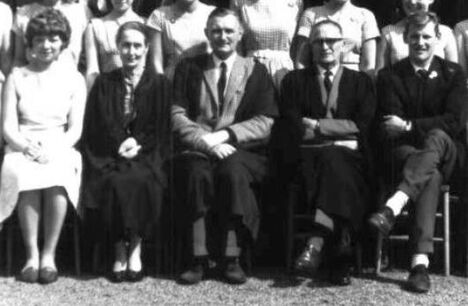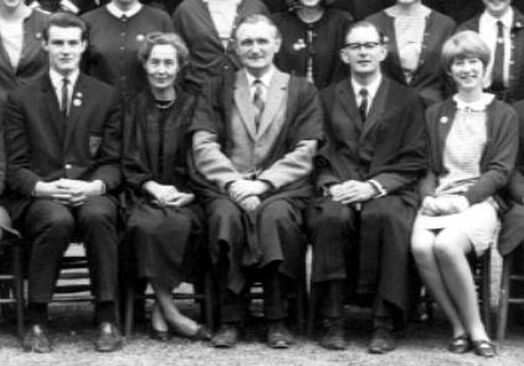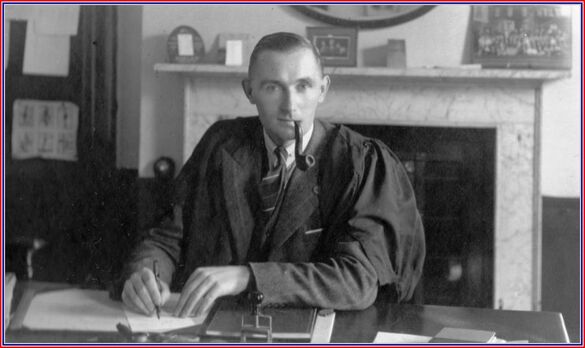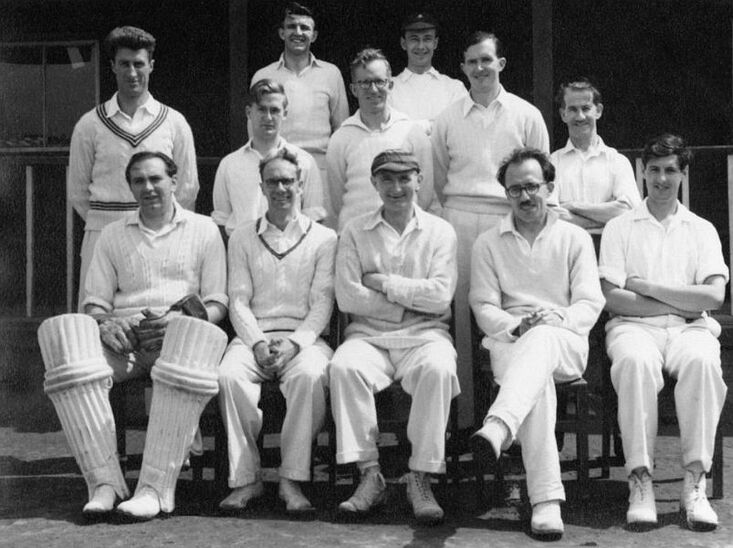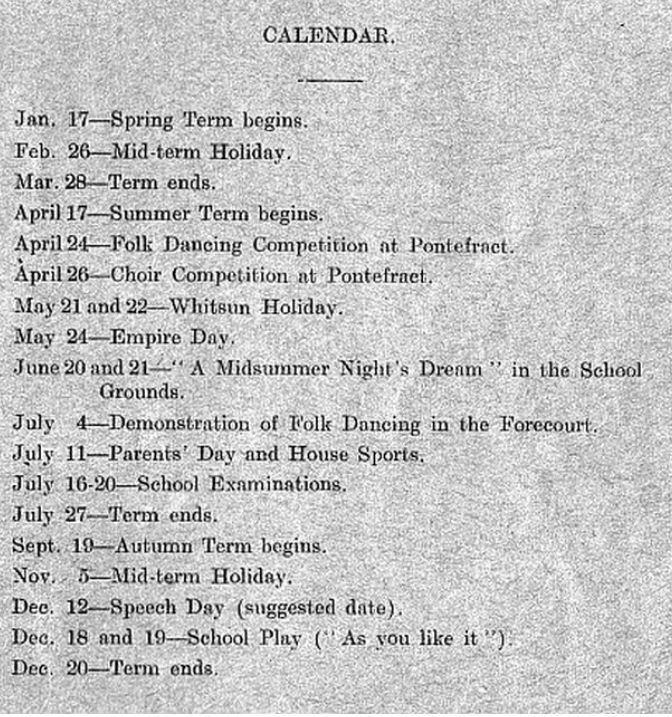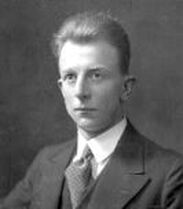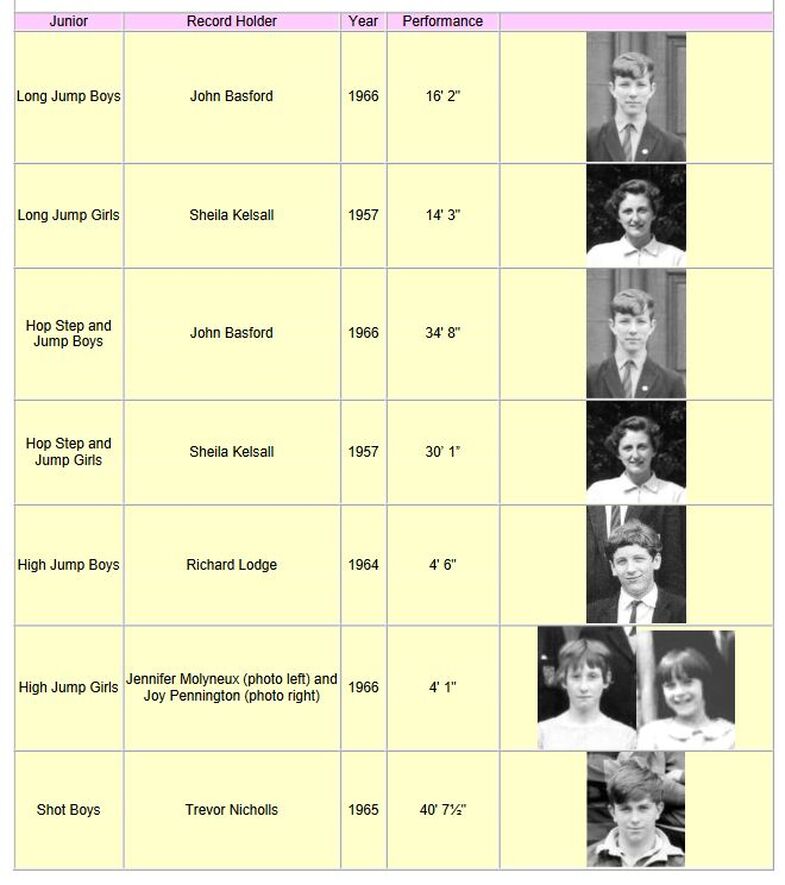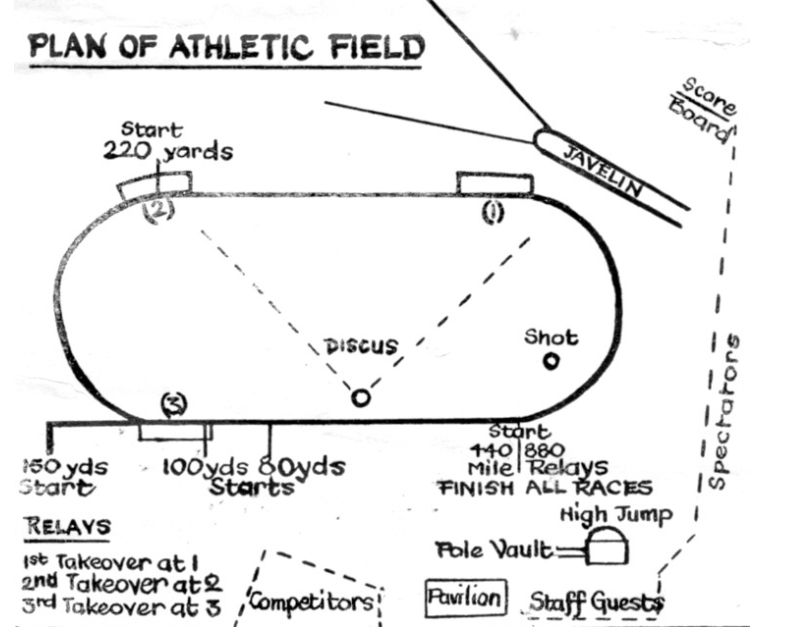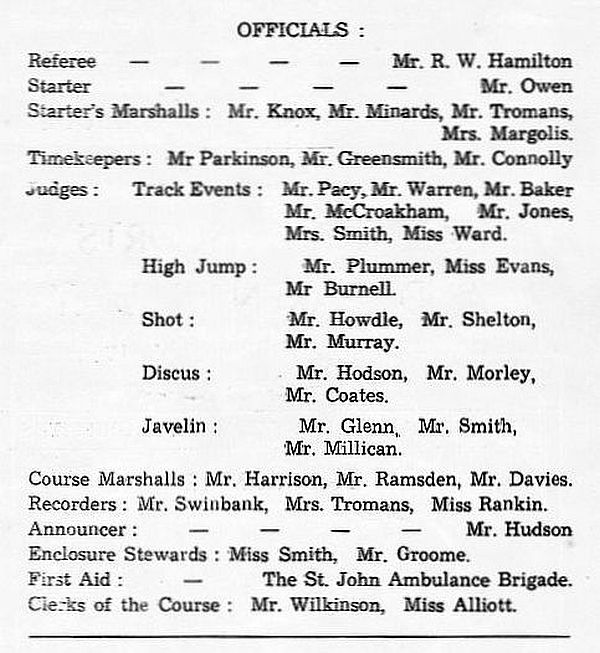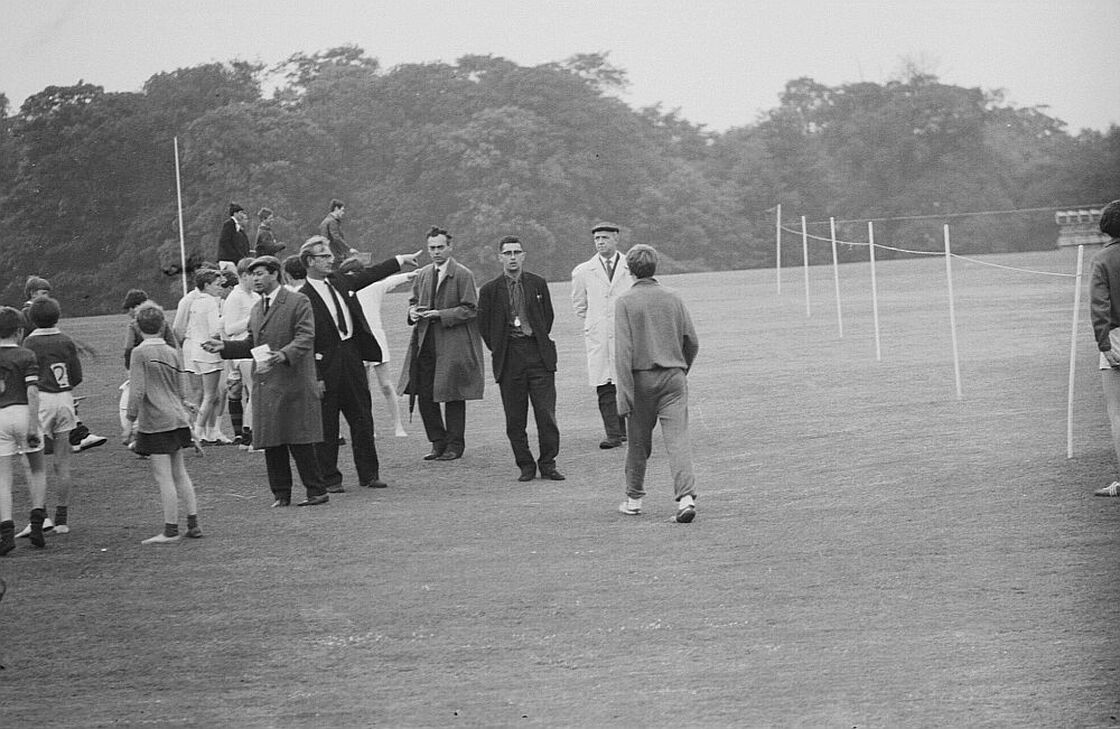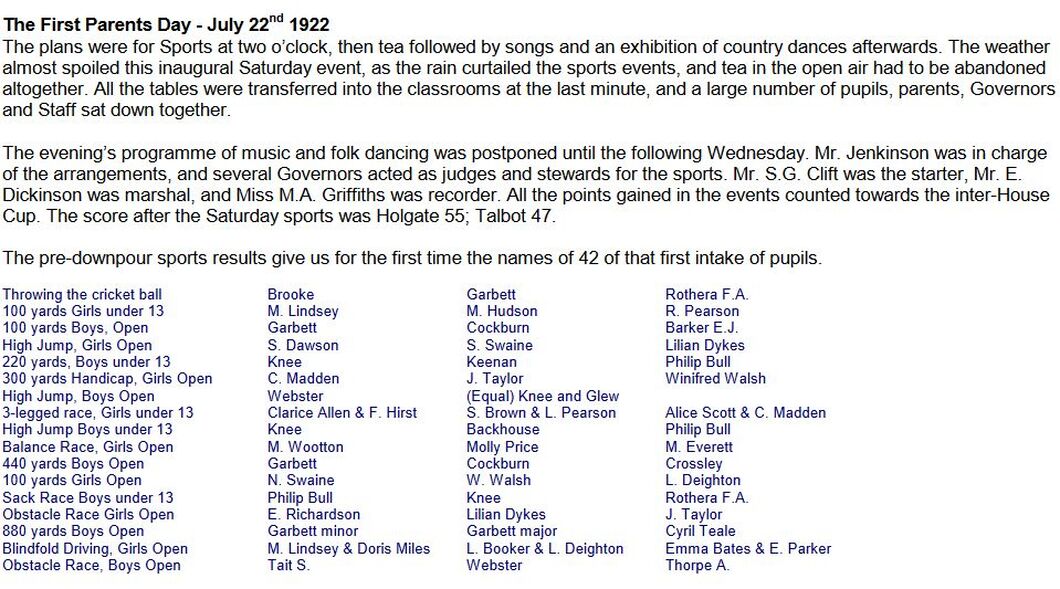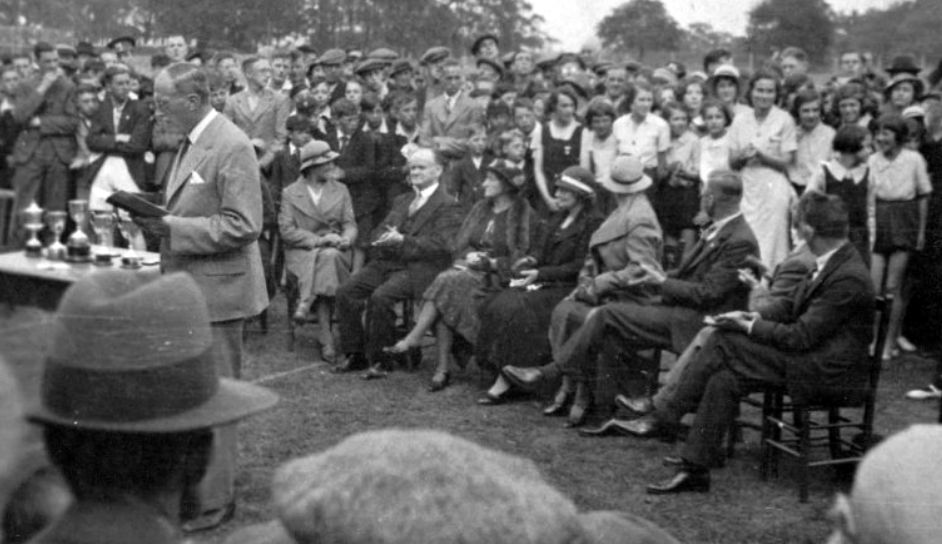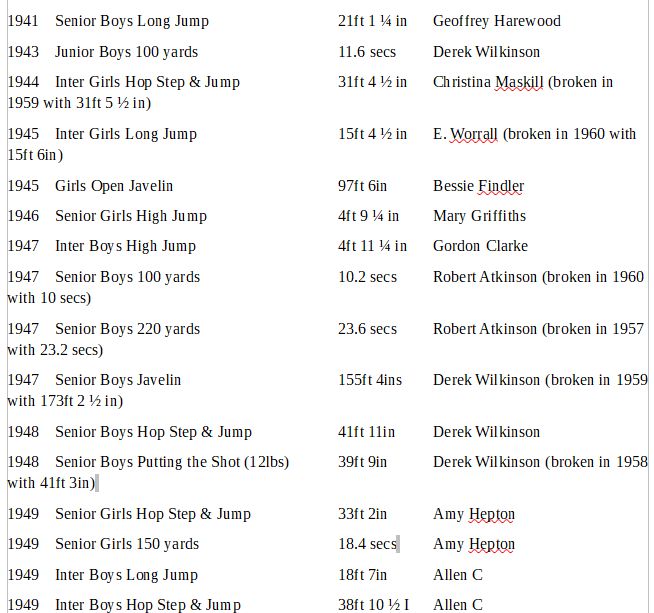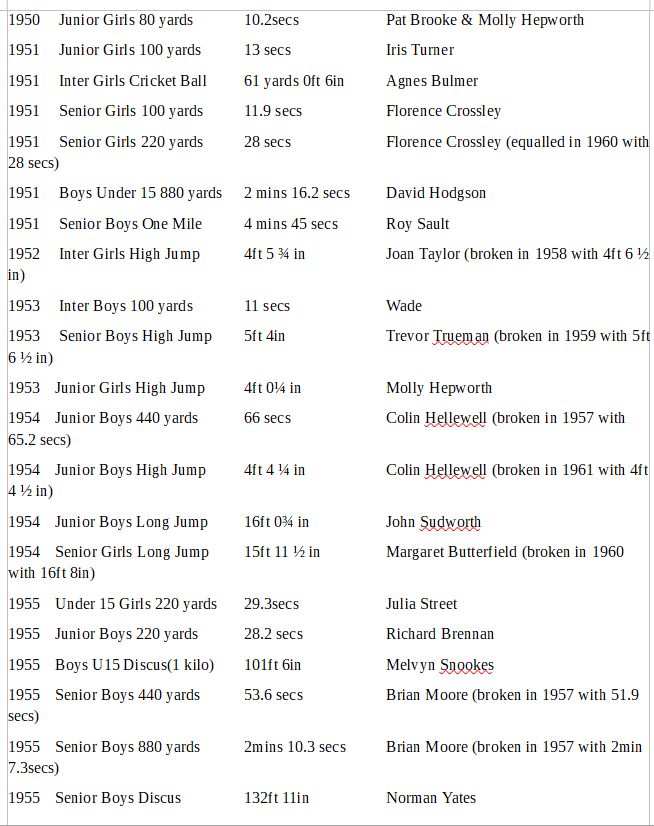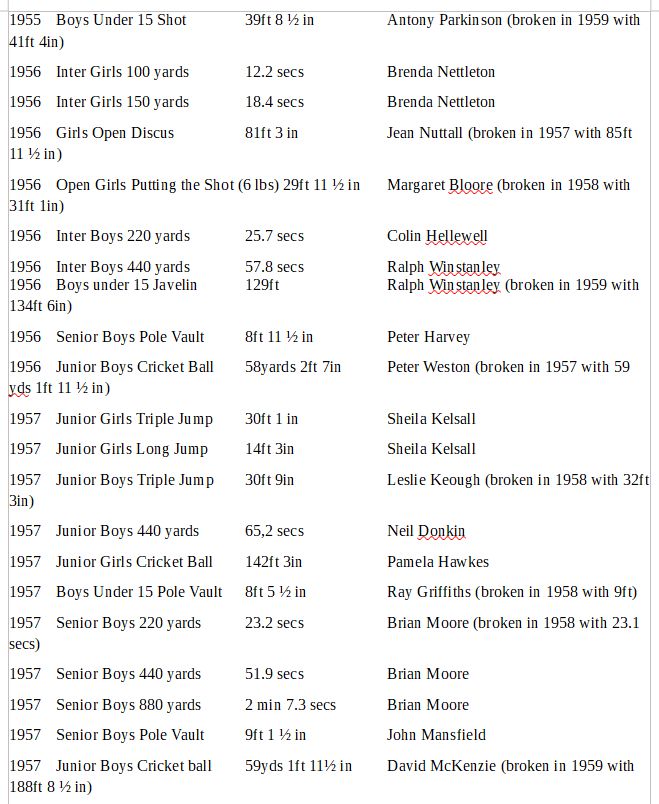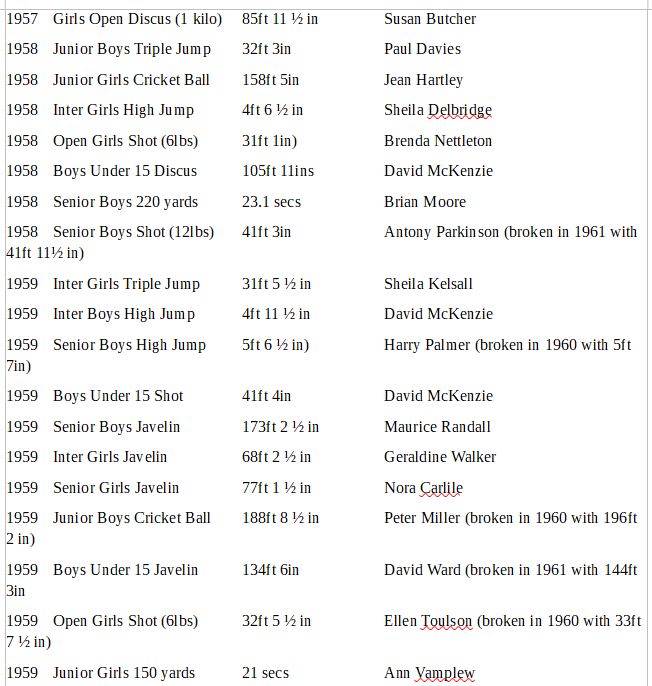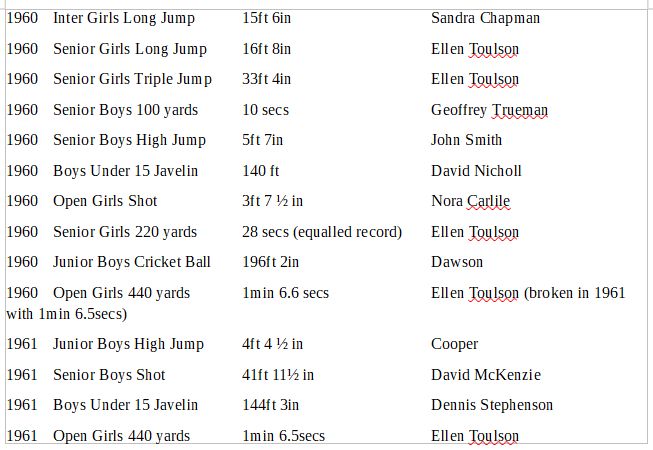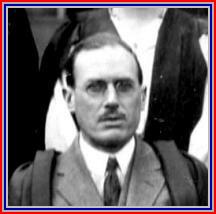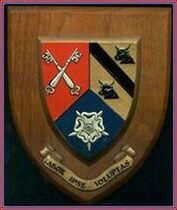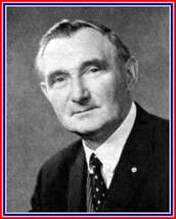Thoughts about HGS 3
5 articles
Updated 14.10.2023
5 articles
Updated 14.10.2023
HGS visits the Festival of Britain in 1951 with Miss McBride and Mr Swinbank
Table of Contents
1. Immersion in The System
2. Staff Matches and beyond
3. Difficult, early HSS times
4. Staff and Sports Days
5. Samples of the School Sports Day Records showing progression over three decades.
2. Staff Matches and beyond
3. Difficult, early HSS times
4. Staff and Sports Days
5. Samples of the School Sports Day Records showing progression over three decades.
1. Immersion in The System
Peter Cooper
"I really cannot believe it is so many years since I left. Looking at all this for the last 3 hours it just seems like yesterday. Happy days, though we probably didn't appreciate just how happy at the time. In those days our whole lives revolved around school, even for sport and leisure. I guess we were lucky to be so well provided for."
Peter Cooper (1956-63, Guest)
Peter Cooper (1956-63, Guest)
Dave McKenzie, 1962
The above quote from Peter is very true and all pupils at HGS experienced this in some way. When I left Upton Junior School (Harewood Lane) in the summer of 1955 and travelled the 7 miles or so each day to Hemsworth Grammar School, I did not know that I was leaving an open, relaxed system and joining somthing quite the opposite. The Grammar School had its set ways and they had not really changed in decades. The system was driven by the two Headmasters, Mr Jenkinson (1921-1937) and Mr Hamilton (1937-1967). To me and for me, the system worked very well and I initially felt at a loss when I left the school in 1962 after 7 years.
The photograph below is extracted from the Prefects' photograph of School Year 1961-1962. At this time, I was definitely part of the HGS establishment and, therefore, part of the system. One of the requirements of the Office of Head Boy was to help maintain parts of the school's system such as discipline and good order through the Prefects. This was in addition to the compulsory curricular requirements (A levels and the non-examinable subjects) and the extra-curricular personal choices. The latter, in my case, were to do with Sport for the school at whatever level was required. I had little interest in taking part in Drama, Music or any of the various clubs and societies which were in existence at that time. My sports were Rugby, Athletics and "sometimes" Cricket. During the year, I also had to organise and compere a couple of school dances, address the audiece at Speech Day 1961 and, sadly, attend the funeral of a member of staff. I was quite busy during the whole of my final year.
Dave McKenzie
Dave McKenzie
L-R: Jacqueline Leonard (the Head Girl), Miss M. Smith, Mr R.W. Hamilton, Mr L.N. Colletter, Dave McKenzie (the Head Boy)
Geoff Cartledge
If you remember ....
When the Upper Sixth took their A levels, the Assistant Prefects took over as Full Prefects for the back end of the summer term. I and a couple of other Lower Sixth pupils had been Full Prefects for all our Lower Sixth year. I was simply informed by Russ Hamilton that the staff thought that I would do a decent job as temporary Head Boy so I did exactly that for about a month. Round about the second week of the following Autumn term, I was in a Physics lesson when someone came to the door and informed the teacher that I was wanted by the Headmaster. When I arrived outside his door, Margaret Biggs was already there so I had an inkling what was about to happen as she was an obvious candidate for Head Girl.
Sure enough we were both formally offered our respective posts, which of course we accepted. We took an oath in full assembly as did the Assistant/Full Prefects although I cannot recall if ours was a slightly different version. We were then handed our silver badges and I wore mine on my blazer lapel along with the Prefect's Badge from the Lower Sixth Year. The best thing was undoubtedly the prestige that went with the job. On several occasions, when edicts were pronounced that did not go down well with the Prefects, I acted as their representative and put a case to Russ on their behalf. I found Mr. Hamilton to be a very fair man and he was quite prepared to listen to our point of view. The main thing I absolutely hated was having to speak in front of large audiences such as at Speech Day - remember the Hippodrome?
Geoff Cartledge
When the Upper Sixth took their A levels, the Assistant Prefects took over as Full Prefects for the back end of the summer term. I and a couple of other Lower Sixth pupils had been Full Prefects for all our Lower Sixth year. I was simply informed by Russ Hamilton that the staff thought that I would do a decent job as temporary Head Boy so I did exactly that for about a month. Round about the second week of the following Autumn term, I was in a Physics lesson when someone came to the door and informed the teacher that I was wanted by the Headmaster. When I arrived outside his door, Margaret Biggs was already there so I had an inkling what was about to happen as she was an obvious candidate for Head Girl.
Sure enough we were both formally offered our respective posts, which of course we accepted. We took an oath in full assembly as did the Assistant/Full Prefects although I cannot recall if ours was a slightly different version. We were then handed our silver badges and I wore mine on my blazer lapel along with the Prefect's Badge from the Lower Sixth Year. The best thing was undoubtedly the prestige that went with the job. On several occasions, when edicts were pronounced that did not go down well with the Prefects, I acted as their representative and put a case to Russ on their behalf. I found Mr. Hamilton to be a very fair man and he was quite prepared to listen to our point of view. The main thing I absolutely hated was having to speak in front of large audiences such as at Speech Day - remember the Hippodrome?
Geoff Cartledge
L-R: Geoff Cartledge, Mr L.N. Collette, Mr R.W. Hamilton, Miss M.Smith, Margaret Biggs
The HGS Senior Staff with the Head Boys and Head Girls of the final years of the school
1966-67 (The last complete HGS School Year)
John Foster and Margaret Preece
2. Staff Matches and beyond
The men and women on the HGS Teaching Staff supported the idea of Pupils v Teachers matches in the Sports offered at the School. This was part of the "informal organisation" within the school. The matches were not compulsory but were considered to be desirable to help to break down any perceived social or educational barriers between pupils and staff. HGS could be quite formal at times. The examination requirements at "O" and "A" Level of the GCE, and before that, the demands of the School Certificate exams, made the formal structure of the school essential. In HGS, those demands/targets were there every year and for some teachers stress Ievels were quite high. The poor behaviour of some pupils did not help at all.
The HGS discipline system used Stars (positive), Stripes (negative) and corporal punishment. These were some of the rewards and sanctions employed. The Stars and Stripes Board, on which every pupil's discipline record was shown, was located at the bottom of the Main Staircase in the Main Building, for everyone to see. This was very near to the School Administration Office and also very near to the Headmaster's Study (as seen below).
Dave
The HGS discipline system used Stars (positive), Stripes (negative) and corporal punishment. These were some of the rewards and sanctions employed. The Stars and Stripes Board, on which every pupil's discipline record was shown, was located at the bottom of the Main Staircase in the Main Building, for everyone to see. This was very near to the School Administration Office and also very near to the Headmaster's Study (as seen below).
Dave
Mr Hamilton (Headmaster 1937-67) in his Study.
Staff Cricket Team 1955-56
Back Row L-R: Mr. Dodd (French), Mr. Colley (History)
Middle Row L-R: Mr. Tate (P.E.), Mr. Wharton (Latin), Mr. Bulley (History), Mr. Farrar (Science), Mr. Manning (Science)
Front Row L-R: Mr. Taylor (Science), Mr. Stewart (Mathematics), Mr. Hamilton (Classics), Mr. Walker (English), Mr. Sale (Science)
Middle Row L-R: Mr. Tate (P.E.), Mr. Wharton (Latin), Mr. Bulley (History), Mr. Farrar (Science), Mr. Manning (Science)
Front Row L-R: Mr. Taylor (Science), Mr. Stewart (Mathematics), Mr. Hamilton (Classics), Mr. Walker (English), Mr. Sale (Science)
3. Difficult, early HSS times
The more I think about it, the more difficult AGJ's problem was. This is explained in detail by the School History section of this website. To set up a new school in a new (to AGJ) and rather impoverished area and in an empty building with minimum basic facilities must have been very difficult. The local culture and dialect, which he probably did not fully understand, must have added to the pressure. He did not have any Staff and sheep were used to keep the grass down! He did not have to be a shepherd as well but he was really starting from a base of zero. Literally everything had to be thought out and put into action. One of his tasks was to prepare pupils for Public Examinations in the minimum time possible. Quite daunting. The school that we knew as pupils, developed from Mr Jenkinson's first moves. The School Calendars below show some of his early thoughts.
Dave
Dave
The first School Calendar 1922
This was printed in the first School Magazine and gives us an insight as to what was initially considered to be both important and possible with so few members of Staff and very limited facilities.
The first Staff of HSS are named below:
Mr Arthur Godfrey Jenkinson, Headmaster, Classics, Appointed 1921
Miss Margaret Ann Griffiths, Deputy Head, Appointed 1921, French
Mr Sydney G. Clift, Appointed 1922, Geography
Mr Philip Crossland, Appointed Sept. 1922, History
Three more appointmens followed in 1923 and the curriculum expanded accordingley.
This was printed in the first School Magazine and gives us an insight as to what was initially considered to be both important and possible with so few members of Staff and very limited facilities.
The first Staff of HSS are named below:
Mr Arthur Godfrey Jenkinson, Headmaster, Classics, Appointed 1921
Miss Margaret Ann Griffiths, Deputy Head, Appointed 1921, French
Mr Sydney G. Clift, Appointed 1922, Geography
Mr Philip Crossland, Appointed Sept. 1922, History
Three more appointmens followed in 1923 and the curriculum expanded accordingley.
Calendar from the School Magazine 1922
Mr Clift
The Staff of 1923-24
Back Row L-R: Mr. Storer, 2, Mr. Crossland
Front Row L-R: 1, Miss. Griffiths, Mr. Jenkinson, Mr. E. Dickinson, Miss. E.D. Robinson
Front Row L-R: 1, Miss. Griffiths, Mr. Jenkinson, Mr. E. Dickinson, Miss. E.D. Robinson
Calendar for the Spring and Summer Terms of 1924
Jan. 16 Spring Term Begins
Mar. 3 Mid-Term Holiday
Mar 27 Leeds Folk Dance Competition
Apr 2-4 House Matches
Apr 11 Reading Competition
Apr 16 Term Ends
May 5 Entrance Examination, 10 a.m.
May 6 Summer Term begins
May 14-15 Pontefract Folk Dance Competition
May 22 Pontefract Choir Competition
May 24 Empire Day
June 9-10 Whitsuntide Holiday
June 18 Dramatic Performance in Quarry Garden
July 4 Folk Dance Festival on Cricket Field
July 15-18 School Examinations
July 26 Parents' Day. House Athletic Sports. Parents' Cricket Match.
July 28-29 House Matches
July 31 Term Ends
Sept 22 Entrance Examination 10 a.m.
Sept 24 Autumn Term begins
Nov 23 Mid-term Holiday
Dec 10 Dramatic Performance, "As you like it."
Dec 15-16 House Matches
Dec 17 Annual Speech Day and Prizegiving.
Dec 18 Term Ends
1925
Jan 12 Entrance Examination 10 a.m.
Jan 15 Spring Term Begins
Jan. 16 Spring Term Begins
Mar. 3 Mid-Term Holiday
Mar 27 Leeds Folk Dance Competition
Apr 2-4 House Matches
Apr 11 Reading Competition
Apr 16 Term Ends
May 5 Entrance Examination, 10 a.m.
May 6 Summer Term begins
May 14-15 Pontefract Folk Dance Competition
May 22 Pontefract Choir Competition
May 24 Empire Day
June 9-10 Whitsuntide Holiday
June 18 Dramatic Performance in Quarry Garden
July 4 Folk Dance Festival on Cricket Field
July 15-18 School Examinations
July 26 Parents' Day. House Athletic Sports. Parents' Cricket Match.
July 28-29 House Matches
July 31 Term Ends
Sept 22 Entrance Examination 10 a.m.
Sept 24 Autumn Term begins
Nov 23 Mid-term Holiday
Dec 10 Dramatic Performance, "As you like it."
Dec 15-16 House Matches
Dec 17 Annual Speech Day and Prizegiving.
Dec 18 Term Ends
1925
Jan 12 Entrance Examination 10 a.m.
Jan 15 Spring Term Begins
4. Staff and Sports Days
Without the Teaching Staff there would have been no Heats Days and Sports Days. Performances were logged and best performances/records were maintained until the school closed in 1967.
Here is a sample of some of the School Sports Day Records.
1967 and Mr Wilkinson (Head of Physical Education) points the way.
Staff L-R: Mr. Tromans, Mr. Wilkinson, Mr. Minards, Mr. Greensmith, Mr. Ramsden
Staff L-R: Mr. Tromans, Mr. Wilkinson, Mr. Minards, Mr. Greensmith, Mr. Ramsden
Getting the competitors into position for the relay race?
The start of the 4 by 110 yards relay.
I wonder who rang the bell for the last lap in the distance events?
Photos: Batey
Mr Jenkinson, the first Headmaster of our school, allowed Sports Days as soon as possible after the school had opened in 1921. Those days were very busy for the small number of teachers who were employed there.
Below are the first thoughts on the structure of Hemsworth Secondary School's Parents' Days.
Some of the basic thoughts did not really change over the following decades.
Some of the basic thoughts did not really change over the following decades.
After the events had finished, the Trophy Winners were presented with their Cups or Shields by the Guest of Honour.
Here Mrs Hamilton presents the prizes in 1967. This was the final HGS Sports Day.
Here Mrs Hamilton presents the prizes in 1967. This was the final HGS Sports Day.
5. Samples of the School Sports Day Records showing their progression from 1941 to 1961.
From Sheila. Thank you.
From Sheila. Thank you.
Hemsworth Grammar School had a number of traditions in which we, as pupils, took part. Sports Day was one of those traditions which involved the whole of the School Community. Heats Days and Sports Days were annual Summer events which were generally looked forward to by pupils, teachers, governors and parents. The activities on the day involved all four of those groups. The original name of Sports Day was Parents Day and was regarded as a very well-organised annual spectacle.
A 1930s HGS prize presentation ceremony at the end of Sports Day.
This tradition hardly changes at all and was usually held close to the Cricket Pavilion.
This tradition hardly changes at all and was usually held close to the Cricket Pavilion.
Age Groups
Juniors (under 13 yrs.3 months)
Intermediates (13.3 – 15yrs)
Seniors (over 15 yrs) as at April 1st
Juniors (under 13 yrs.3 months)
Intermediates (13.3 – 15yrs)
Seniors (over 15 yrs) as at April 1st
The lists below show who the HGS record breakers were. In the Sports Section of this website are listed the multiple record breakers and the Final Record breakers.
Sample 1
1941-49
1941-49
Records Sample 2
1950-55 from the 1950s Records Part 1
1950-55 from the 1950s Records Part 1
Records Sample 3
1955-57 from the 1950s Records Part 2
1955-57 from the 1950s Records Part 2
Records Sample 4
1957-59 from the 1950s Records Part 3
1957-59 from the 1950s Records Part 3
Records Sample 5
1960-61 from the 1960s Records Part 1
1960-61 from the 1960s Records Part 1
This page is now complete.
